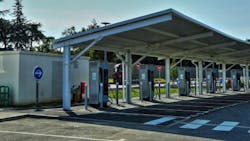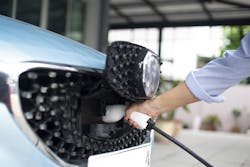Partnership Formed for IoT EV Charging Stations in Europe
ENGIE Vianeo, the EV charging business of energy company ENGIE Group, is partnering with communications platform BICS to connect its charging stations to IoT in European countries.
The aim is to provide real-time data which allows for remote maintenance and "enhanced decision-making," according to a press release.
New electric car registrations reached nearly 3.2 million in 2023 in Europe, increasing by almost 20% from 2022, driving demand for more accessible charging infrastructure. Last year, the EU approved a new law to add more chargers across its member states, with specific targets for 2025 and 2030. This legislation put specific emphasis on installing stations across main highways.
ENGIE launched its charging business, ENGIE Vianeo, last year. It has now partnered with BICS in a move to upgrade the technology supporting its expanding estate.
By utilizing BICS’ IoT connectivity portal ‘SIM for Things’, ENGIE is upgrading its EV charging estate into a network of IoT devices to "improve efficiency, reliability, and user convenience," BICS says.
Real-time data collection
The solution supports remote maintenance and troubleshooting, analytics on station activity, and enables remote software and firmware updates. These are determining rating criteria recognized by the users. Previous iterations of the technology have used a ‘black box’ fitted to the stations, these would collect data but have to be physically collected and processed, while this new partnership has "real-time, remote data collection" from the highway to ENGIE Vianeo’s European supervisory center.
The real-time data provided by the solution will also improve customer experience, BICS says, described by ENGIE Vianeo as a “key element of the transition to a lower-emission mobility model”. Users will be able to see live information, via their phone app, on nearby charger availability or the charging status of their vehicle.
“The appetite for electric cars is growing across Western Europe,” says Clémence Fischer, Managing Director, ENGIE Vianeo. “We aim to meet this demand by rapidly expanding our number of charging stations. In France alone, we aim to have 12,000 charge points by the end of 2025. In Belgium, we expect to double the current number of charging stations to exceed 5,000 charge points by the same date. Managing such a large, dispersed estate presents challenges, so alongside BICS, we’re investing in technology to give us complete visibility over our infrastructure. This will help us improve the prompt response of our services and keep stations maintained and running reliably, so they’re always ready and available when customers need them.”
Due to the typical locations of charging stations, in built-up metropolitan areas or remote highways, mobile connectivity (as opposed to fixed fiber) is a must. BICS is providing the internet connection, the SIM cards to connect the charging stations, and its SIM for Things platform.
While the initial rollout for these ‘connected chargers’ will focus on Belgium, they will later expand across Western Europe, including France, Italy and Spain. Around 50,000 devices are expected to be deployed as part of the collaboration.

